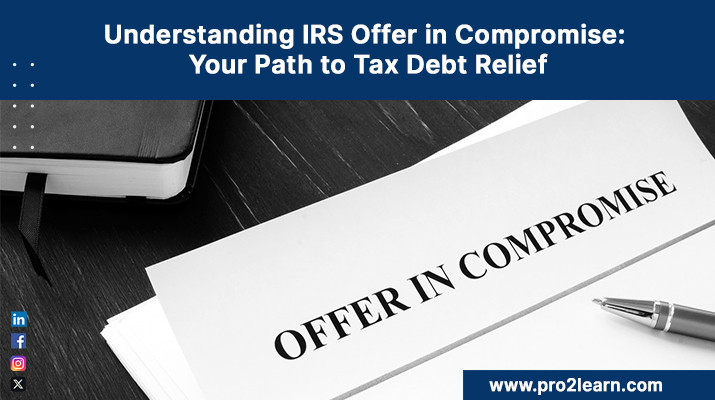Fri, Mar 01,2024

Understanding IRS Offer in Compromise: Your Path to Tax Debt Relief
Tax debt can weigh heavily on individuals and businesses alike. However, the Internal Revenue Service (IRS) offers a ray of hope through its Offer in Compromise (OIC) program. This initiative aims to provide taxpayers grappling with tax liabilities a pathway to financial relief.
To qualify for an Offer in Compromise, individuals must meet specific criteria set forth by the IRS. This includes demonstrating financial hardship or unfairness in paying the full tax debt. Additionally, compliance with all filing and payment requirements is essential, along with the absence of ongoing bankruptcy proceedings.
The IRS offers two primary types of Offers in Compromise: Doubt as to Liability and Doubt as to Collectibility. The former is for those disputing the amount of tax owed, while the latter caters to individuals facing financial hardships hindering full payment.
Navigating the Offer in the Compromise process involves several steps. First, taxpayers need to gather pertinent financial information and complete the required forms, including Form 656. Once submitted to the IRS, the offer undergoes review, and negotiations may ensue. Patience is key during this period as the IRS evaluates the offer's merits.
Determining the offer amount hinges on various factors, including income, expenses, and asset equity. The IRS utilizes specific formulas to arrive at a fair and reasonable compromise amount based on the taxpayer's financial circumstances.
Submitting the offer package accurately and promptly is crucial. Common mistakes during this phase can lead to delays or even rejection of the offer. Therefore, meticulous attention to detail is paramount to ensure a smooth submission process.
Negotiating with the IRS demands a strategic approach. Taxpayers must present compelling evidence of financial hardship and be prepared to engage in meaningful discussions to reach a mutually acceptable agreement.
Upon acceptance of the offer, taxpayers must adhere to the agreed-upon terms and make timely payments. Various payment options are available, offering flexibility to taxpayers based on their financial capabilities.
The repercussions of failing to pay taxes extend beyond monetary penalties. It can adversely affect one's credit score and overall financial well-being, underscoring the importance of addressing tax debt proactively.
While an Offer in Compromise presents an attractive option for tax debt resolution, alternative avenues such as installment agreements or Currently Not Collectible status may better suit some taxpayers' circumstances.
Examining real-life examples of successful Offers in Compromise offers invaluable insights into navigating the process effectively. These case studies highlight the importance of thorough preparation and professional assistance when needed.
Dispelling myths surrounding the Offer in Compromise process is essential to encourage taxpayers to explore this viable option for tax debt relief. Addressing misconceptions fosters a clearer understanding of the program's benefits and eligibility requirements.
Taxpayers navigating the complexities of the Offer in Compromise process may benefit from seeking professional assistance. Tax professionals or attorneys can provide invaluable guidance and support, enhancing the likelihood of a favorable outcome.
The IRS offers various resources, including websites, publications, and tools, to assist taxpayers in understanding and navigating the Offer in Compromise process effectively.
In conclusion, the IRS Offer in Compromise program offers a lifeline to taxpayers burdened by tax debt, providing a viable path to financial relief. By understanding the eligibility criteria, navigating the application process diligently, and seeking professional assistance when needed, taxpayers can pave the way toward resolving their tax liabilities and securing a brighter financial future.
1. Can I apply for an Offer in Compromise if I'm currently in bankruptcy?
While individuals in an open bankruptcy proceeding typically cannot apply for an Offer in Compromise, they may explore other options for resolving their tax debt. Consulting with a bankruptcy attorney or tax professional is advisable to determine the best course of action.
2. What happens if my Offer in Compromise is rejected by the IRS?
If the IRS rejects your Offer in Compromise, you have the right to appeal the decision. It's crucial to understand the reasons for rejection and address any deficiencies in your offer package before initiating the appeals process.
3. How long does the Offer in Compromise process take?
The timeframe for processing an Offer in Compromise varies depending on various factors, including the complexity of the case and the IRS's caseload. Generally, it can take several months to over a year for the IRS to review and make a decision on an offer.
4. Can I negotiate the terms of my Offer in Compromise with the IRS?
Yes, taxpayers can negotiate the terms of their Offer in Compromise with the IRS, particularly regarding the settlement amount and payment terms. However, it's essential to approach negotiations thoughtfully and provide compelling evidence to support your proposed terms.
5. What happens if I default on my Offer in Compromise payments?
Defaulting on Offer in Compromise payments can have serious consequences, including revocation of the offer and reinstatement of the full tax liability. It's crucial to communicate with the IRS promptly if you encounter financial difficulties to explore alternative payment arrangements and avoid default.

Understanding IRS Offer in Compromise: Your Path to Tax Debt Relief &...

The IRS has updated the employer shared responsibility (ESR) p...